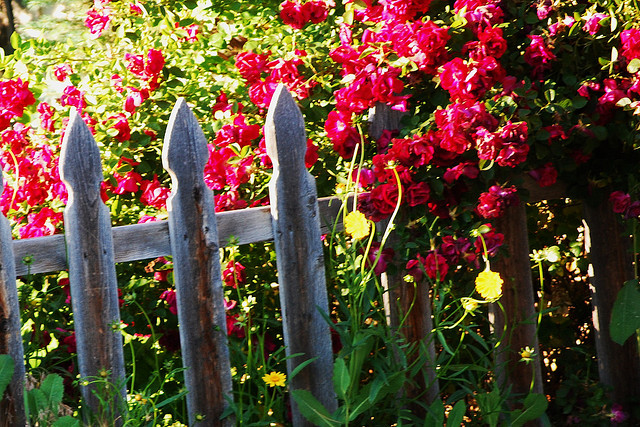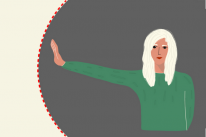
“Some people think it’s holding that makes one strong–sometimes it’s letting go.” ~Unknown
Today I’ve been thinking about fences, I guess as a metaphor for boundaries in life. There are many different kinds of fences, but that they all have the same purpose: creating a boundary.
Whether it’s a sweet white picket fence with roses or the electrified chain fencing at a federal prison, what it signifies is a line drawn in the sand. This is either a starting place or a stopping point, depending on your point of view.
Creating boundaries has always been a challenge for me. Until now, maybe still, I have needed to use anger to build my fences, to re-enforce my boundaries.
I recently became so angry with a family member that the anger seemed totally disproportionate to the deed. But I felt invaded, used, taken advantage of. I accused, I shouted, I slammed out the door. Nothing like being really, really mad to build a very solid fence.
But the effect on my body was like hauling the heavy cement blocks into place and then pounding them into their position. It took a huge toll, not to even begin to mention the effect this had on my emotions and on my spirit.
After my “anger fence” was firmly in place, I was exhausted; muscles rigid with residual fury, unable to even appreciate the fence so firmly planted. Yes, I had created a very defined boundary, but at what great cost, both to myself and to my family?
Isn’t there an easier way? Something that gets the job done and doesn’t leave me incapacitated during the recovery? Could creating a boundary be justified by just a need, a respect for my and others’ positions and not by the burning wrath I have required in the past?
How would it feel to simply state my requirements for my needs and for my comfort with the simple assumption that they would be respected and acknowledged? Why is it so difficult to just say “no” or “I can’t” or “I don’t agree with that”?
These are simple words, used regularly by toddlers, and yet for me, they represent the most complex foreign language. These small words are some of the most difficult for me to pronounce.
In my own life, I think the bottom line is a sense of unworthiness. Because I have not felt I had the right to set limits, I have needed to create a lot of anger to give me the energy to take care of my needs. I have regularly created huge arguments with the sole purpose of building fences to protect myself.
Surely there is a simpler process that does not involve so much collateral damage both to myself and to the others involved. I am willing to say that my old method is now too costly, for my body and my soul.
I’m ready to finally do a U-turn on the freeway of life with this one. I am heading in a new direction; I’m naming this destination compassionate responsibility—learning to responsibly care for my own needs but with compassion, both for myself and for others.
It’s a country with new words, but I’m practicing it until it is easy–a new second language. I’m using this new dialect in small conversations; a “No, thank you” uttered with kindness but firmness, an “I’m sorry but I can’t do that now” bravely responding to a request.
And the outcome is a softer fence, perhaps more of a hedge. Still a boundary, still a limit, but so much easier to maintain. So much lovelier to have in my life.
And an added bonus for this decision is the fact that when any of us makes a change, it affects us all. Perhaps my softer, gentler fence will give way to one for you. Maybe we’ll all meet at compassionate responsibility and have a party!
Photo by Edgar Zuniga Jr.
About Karen Mead
Karen Mead is an alchemist, an explorer and a fellow traveler on this journey of life. Visit her blog, The Peaceful Journey , or check out her website, A Peaceful Path .













 Though I run this site, it is not mine. It's ours. It's not about me. It's about us. Your stories and your wisdom are just as meaningful as mine.
Though I run this site, it is not mine. It's ours. It's not about me. It's about us. Your stories and your wisdom are just as meaningful as mine. 